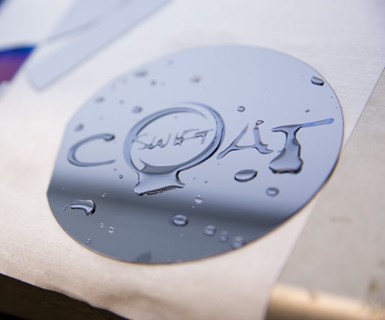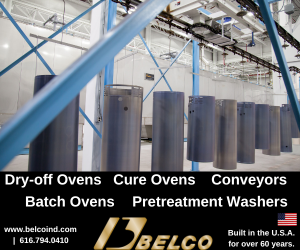Swift Coat Nets $1M to Commercialize Self-Cleaning Nanocoatings
The project aims to reduce efficiency losses in solar panels due to soiling, the buildup of dirt on the panel’s surface that blocks sunlight.
Swift Coat, an Arizona State University spinout company specializing in nanocoatings, was selected to receive a $1 million award from the U.S. Department of Energy Solar Energy Technologies Office (SETO) to advance innovations in solar manufacturing.

A patterned film of nanoparticles used to attract water droplets and keep surfaces clean made using Aerosol Impact-Driven Assembly, Swift Coat’s proprietary nanoparticle coating technology. Photo by Jessica Hochreiter, Arizona State University.
The project aims to reduce efficiency losses in solar panels due to soiling, the buildup of dirt on the panel’s surface that blocks sunlight.
“Everyone has seen how dirty their windows can get after a dust storm, but few realize the same happens to their solar panels,” says Peter Firth, Swift Coat chief executive officer. “This buildup of dirt can reduce the power output of panels by up to 30% and, if you aren’t the type to climb up on your roof and clean them, this loss of efficiency can persist for months.”
Swift Coat’s solution to this problem is a thin coating composed of nanoparticles.
“The special nanoparticles in our coating perform a chemical reaction powered by ultraviolet sunlight that actively breaks down dirt, keeping the panel clean and operating at optimal efficiency,” says Dr. Shannon Poges, Ph.D., Swift Coat’s senior engineer.
Partners on the award include a large, US-based glass manufacturer and the National Renewable Energy Laboratory, a premier solar research institution in the U.S.
“Soiling can be just as big a problem for utility- scale solar installations as it is for homeowners,” says Zachary Holman, Ph.D., Swift Coat chief technology officer and associate professor at Arizona State University. “These partnerships will help us to rapidly deploy the technology across the country, putting money back into your pockets in the form of a reduced electricity bill, whether you own panels or not.”
Swift Coat was selected as a part of the SETO Fiscal Year 2019 funding program, an effort to invest in new projects that will lower solar electricity costs while working to boost solar manufacturing, reduce red tape and make solar systems more resilient to cyber attack. Swift Coat is one of several manufacturing innovation projects with early stage product ideas that can lower solar costs and rapidly achieve commercialization, with an emphasis on projects that contribute to a strong U.S. solar manufacturing sector.
This award will help Swift Coat grow toward commercialization of its coating technology, which has demonstrated applicability in energy, defense and building material industries.
Related Content
-
Cordless Sprayer Offers 3 Configurations
Titan’s Impact X 120 18V sprayer delivers up to 4 gallons per charge, reducing overspray by 50% and using a single battery system for multiple tools.
-
Energy Efficient SprayWand Pretreatment System
P-450 Energy Efficient SprayWand Pretreatment System Source: PEM PEM Inc., a leader in providing innovative batch and automated finishing equipment to OEMs, fabricators and job shops, will display its SprayWand, FinFlow and SprayLean brands.
-
AkzoNobel Opens World-First Testing Facility for Wind Turbine Blades
AkzoNobel's state-of-the-art wind turbine blade testing site simulates extreme weather and runs high-speed tests, driving innovation in protective coatings.












